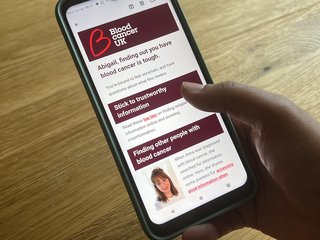I've just been told I have blood cancer
I've just been told I have blood cancer
This information is for anyone whose just been diagnosed with blood cancer – whether it’s leukaemia, lymphoma, myeloma, myelodysplastic syndromes (MDS) or myeloproliferative neoplasms (MPN).
Being told you have blood cancer is a tough thing to hear. Some people say they felt like they were in a whirlwind, or that their world had been turned upside down. Others say time seemed to stand still.
You’re bound to feel uncertain about the future and have questions about what your diagnosis means for you, and what will happen next.
These pages aim to tell you what to expect, and where to get help when you need it. Your family and friends might want to read them too.
You might also want to order our booklet for anyone newly diagnosed with any blood cancer: Your blood cancer diagnosis: What happens now? Order free copies for yourself, your family and friends.
If someone you love has been diagnosed, you might find our information for family and friends helpful, including the Blood Cancer Heart to Heart podcast.
We also have specific information for young adults and information created with and for people affected by blood cancer in the Black community.

Get a weekly support email from us
We'll send you clear and simple information, practical tips, and advice from other people with blood cancer, to help during the first few weeks and months after diagnosis.
If you have questions, worries or just want to talk about what's going happen, don’t wait. Speak to your GP, consultant or specialist nurse. Or contact our Support Service free on 0808 2080 888, or [email protected]
Your family and friends are very welcome to contact our Support Service free on 0808 2080 888 or [email protected]
We also have online information for family and friends, and they may find it helpful to listen to the Blood Cancer Heart to Heart podcast where people share what it's like when a loved one is diagnosed with blood cancer.
Other people who’ve been diagnosed with blood cancer will understand what you're going through. It may help to talk to them in our online community forum
Your rights as someone with blood cancer
There are some things that are useful to know from the beginning, that people sometimes don't find out till later.
- You should be given a named key worker – Someone in your medical team should act as your main point of contact for everything to do with your medical care and wellbeing. This is usually a clinical nurse specialist (CNS). If you haven’t been given a named key worker, don’t be afraid to ask for one.
- You have legal protection as someone with cancer – Cancer is considered a disability under UK equality laws. This means your employer or place of education mustn’t discriminate against you while you’re ill or afterwards. You also have rights as a patient and can ask for a second opinion from another doctor at any time.
- You may be able to get financial support – Ask your GP or hospital team for advice about your financial situation. Hospitals sometimes have advisers who can help you apply for any benefits you’re entitled to. If you normally pay for prescriptions, you can apply to get prescription medicines for free.
Will I be cured?
For lots of people, this is their first question. Thanks to research, treatments are being developed and improved all the time. Thousands of people are treated successfully in the UK every year.
With some blood cancers, treatment aims to put you into remission. This means there’s no sign of cancer left, or the level is so low it’s no longer a problem. Some people stay in remission and can consider themselves cured. Others may need more treatment later on.
For other blood cancers, treatment usually aims to manage the condition so you can live with it and enjoy a good quality of life.
You can ask your medical team at any time about the aims of treatment, and what’s likely to happen in the future (your prognosis). Your prognosis is individual to you. It'll depend on the type of blood cancer you have and things that are personal to you, such as your overall health.
What can I do to help myself?
Eating healthily and staying active is known to help people with cancer, both physically and emotionally. So try to follow general advice on diet and exercise from a trustworthy source. We have information on eating well and keeping active.
If you smoke it’s best to give up or at least cut down. Your GP or medical team can help you if you decide to quit. The NHS has more information about giving up smoking. Smoking is especially harmful for people who’ve had chemotherapy, so if it's too much to give up now, think about doing it after you've had treatment.
Although they can’t cure cancer, complementary therapies like massage, meditation and acupuncture may help you manage symptoms and side effects or help with stress. Speak to your medical team about whether a particular therapy is OK for you.
You may hear that particular foods or supplements will help you, but there’s rarely any proper scientific evidence to support these claims. Discuss it with your medical team before trying something new, to make sure it’s safe for you and won’t interfere with any treatment you’re having.

Accessing information when you’re first diagnosed
Vij talks about the value of reading up on your condition.
More information on About blood cancer
Blood cancer types
I've just been told I have blood cancer
What is blood cancer?
What causes blood cancer?
How does blood cancer start?
Blood cancer prognosis
Blood cancer tests
Blood cancer symptoms and signs
Blood cells
Staying safe
Leukaemia
Lymphoma
Blood Cancer UK health information
Myelofibrosis (MF)
Essential thrombocythaemia (ET)
MGUS (monoclonal gammopathy of undetermined significance)
Blood cancer treatment and side effects
